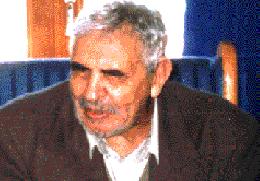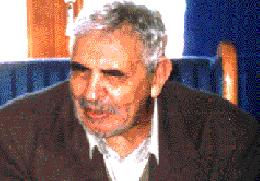
The YSP and Al-Baradouni: Looking for Hope [Archives:2000/36/Focus]
September 4 2000
COMMON SENSE
By: Hassan Al-Haifi

At the time, the optimism that most Yemenis always keep in the back of their minds and ready to flare out at the slightest gesture of good intents from their leaders, lead them to think that alas, had prevailed and the implication was that Yemen’s troubles are over. Unification was thought to be the gateway to prosperity and hope. With the insistence of our Southern Brothers that democracy and political pluralism should crown the unification agreement and should be an integral feature of the Republic of Yemen, the Yemenis throughout the world, and not just in Yemen, considered this to be the turning point in Yemen’s history, if not the whole region, and that their country was embarking on a new cultural and political leap to progress. However, as usual their leaders had tickled their hearts again.
Of course, the YSP had begun a noticeable transformation even before the unification agreement. Being left alone after the Soviet Union ceased to be with their umbilical cord cut, they wisely took on a totally new image, shedding off all their former gung-ho leftist rhetoric and radicalism and projecting a totally open regime, that wanted to make up for all the hardships their people have suffered for so many years under their former totalitarian structure. In fact, it would not be far fetched to think that the regime in Sana’a saw in this quick turn around, which the regime in Aden had put on, as a possible threat to their own survival, along with the fact that the time was opportune to get the regime in Aden to end the insensible fragmentation of the country once and for all. Moreover, it would not be an exaggeration to state that it might have been possible for the YSP to succeed, under such a new image, considering that it is fairly easy for them to adapt the state apparatus under their control to the new image, which theoretically would not have been a threat to their hold on power, as they still controlled most of the apparatus of the state and since any new parties that would surface under the new regime that was in the making are bound to come out as offshoots of the YSP itself. The literature of the YSP leadership that was issued at that time seemed to indicate that most of the YSP leaders not only understood what the transformation meant, but also that they welcomed it appreciatively. However, the regime in Sana’a saw their survival as resting on a united Yemen and literally set their hearts and minds to ending this artificial break-up, especially before the transformation in the South had a chance to set in, so the YSP leaders were left with no choice but to accept the unification proposals once their “partners” in Sana’a accepted the YSP insistence on including political pluralism and democracy as part and parcel of the unification agreement, in addition to the elements of the transformation in the South that the YSP had begun to undertake institutionally and legislatively, prior to the unification talks.
For sure unification for both regimes was really a matter of survival, but, for sure, each side felt that with unification, there is still a chance for one to prevail over the other, although the methods visualized by each were nowhere similar. The YSP rightly thought that with democracy and a populist platform there is no chance that they can be washed out of the political arena, but they underexaggerated their “partner’s” ability to find its own methods of overcoming its shortcomings in the political democratic progress envisaged, and its ability to make the maximum use of the political assets that it has engrained for itself in the political arena, along with the muscle to back it up. While much of what the YSP brought into the unified state platform did make a lot of political sense, and had the world and, more specifically, the regional scenario remained constant, the YSP might have been able to insure a more lasting presence within the framework of the state of the Republic of Yemen, which they helped to create. However, the Gulf War, shook the entire country like a thunderous earthquake and the miscalculated official policy on the crisis, made the crisis an economic and social nightmare for Yemen, that it has yet to come out of even to this time. Though the Government insists that it’s policy is not miscalculated by rather “misunderstood”, there is no question that the repercussions of the crisis on Yemen, turned everything in the country inside out with poverty and many other social ills setting in, once the backbone of the economy – one mullion emigrant workers in the Gulf forced to come home – was broken. Accordingly, the Yemeni population was in no mood to be bothered with the politics at home, since more urgent matters, such as finding food and shelter, took on greater prominence. Thus, the YSP was caught in the middle of a struggle for power, it found that it cannot really engage in because the party had forgotten how to enjoy the atmosphere it had insisted so much on; democracy and political pluralism. Moreover, it appeared that the People’s General Congress and their allies the Islah had been more successful in mobilizing the popular support that the YSP had hoped to build up over time to make up for any shortages they may have in assets. The YSP could not come up with the creativity that would have been able to shield the party from the more aggressive and seemingly better planned and prepared for onslaughts that progressively increased against the YSP over the transitionary period (1990 – 1994), eventually leading to the fateful war ‘civil war of 1994. Moreover the YSP cadre apparently proved their own lack of sincere fealty to their party, as many of the party members became easy prey for the lucrative offers made by their “enemies” to betray their own principles and their own political affiliations and thus by the time the war had come, a large element of the party had sought to exchange their political fortune with satisfying their materialistic hunger, which the YSP leadership was not as “loose” in adapting to accordingly.
The war was an easy finish for the removal of the rest of the physical assets of the YSP out of the way and for demoralizing the Party as an effective political organization. However, all that is history now. Yet, the YSP still clings to notion that unless they become reinstated as a party-regime, with all their assets given back to them. They are helpless and can only cry over spilled milk. If the YSP thinks it can only do anything after getting back “its assets and rights”, the observer then would wonder why it could not do anything when it did in fact have its assets and formidable elements of power. To the observer, it seems to be rather a case of poor management and poor understanding of themselves and their opponents, which the Conference is really going to have to deal with head on, if the party is to make any further progress in the near future. Moreover, the YSP must forget about having to rely on its relations with the existing regime at the helms, while it forgets that without a strong grass roots backing, assets are meaningless in any political game, where there are always winners or losers, without necessary having to be associated with rights or wrongs respectively.
——
[archive-e:36-v:2000-y:2000-d:2000-09-04-p:./2000/iss36/focus.htm]


